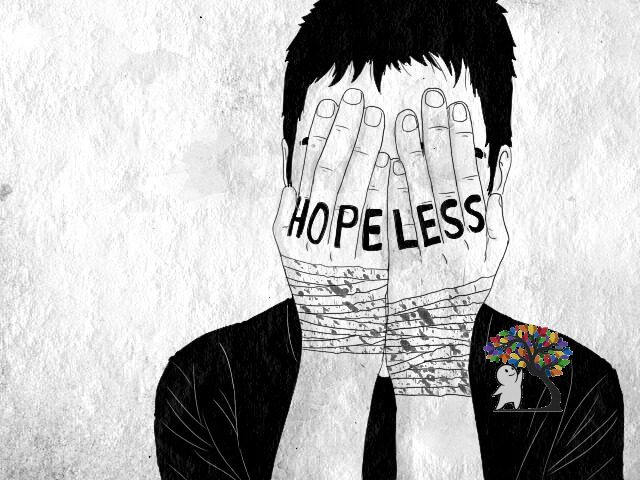5 Signs Overthinking is Giving You Depression

Did you know that, according to a study by Queen’s University, the average person has 6,200 thoughts per day? However, we know that not all thoughts are equal. Some are useful and healthy, while others are harsh and unhealthy. Even worse, when we overthink unhealthy thoughts, we are at risk of mental conditions like depression. But how can we tell if our thoughts are putting us at risk?
Here are 5 signs overthinking is giving you depression.
This is a disclaimer that this article is for informative purposes only. It is not intended to diagnose or treat any condition. Please reach out to a qualified healthcare provider or mental health professional if you think you may have depression.
1) You worry about problems instead of looking for solutions

Are you bothered by a problem that’s happening right now, something that happened in the past or something that you expect in the future? It’s natural to think about situations that affect us, but we should focus our attention on finding a solution. If you’re repeatedly dwelling on bad outcomes, emotional distress or how things are out of your control, this is unhealthy rumination. Studies show that people with depression claim to be reflecting on problems to get a better understanding. However, when they actually say their thoughts out loud, they are clearly ruminating on the same negative emotions over and over without any real goal. So the next time you think about a problem, ask yourself, is this a productive worry or is this just worrying for the sake of worrying?
2) You brood on your own mood

When you’re in a bad mood, how do you cope? Healthy ways include spending time with others, distracting yourself with a hobby or understanding the cause so that you can prevent it in the future. However, it’s unhealthy to brood on your own bad mood and its consequences. That means wondering whether it will look bad to others, whether you’ll get anything done today, or how long the emotions might last. Dwelling on negative emotions can cause even more negative emotions, spiralling out of control and putting you at risk of depression. So the next time you are in a bad mood, try not to trap yourself in the same emotional state by dwelling on it.
3) You dwell on your personal shortcomings

If I asked you to picture your ideal self, how similar is it to your current self? Was the comparison inspiring you to try harder or was it discouraging and negative? Self-awareness is a very useful skill to exercise, as it helps us to reflect on our actions and improve ourselves. However, dwelling only on your shortcomings can lead to excessive self-criticism and a negative sense of self. Research shows that when we become aware of goals we have failed, standards we don’t reach and mistakes we’ve made, we experience anxiety and a need to escape. If we keep thinking about these things, the feelings can develop into depression and the need to escape can develop into thoughts of self-harm or even suicide. So the next time you become aware of your shortcomings, try to think about your strengths as well.
4) You think the future is hopeless

Do you have much hope for the future? As we mentioned earlier, thinking about problems or personal shortcomings is healthy when it’s directed towards improvement. However, people with depression usually feel that there is no hope for the future and improvement is impossible. They dwell on the idea that the situation is fixed, everything is out of their control and they will be flawed forever. Needless to say, thinking that nothing will ever get better will only make you fail more and more, making the problem even worse. So the next time you are faced with problems, find reasons to hope for a good outcome, or redirect your attention to other problems where you can make a difference.
5) You engage in meta-rumination

Now that we’ve discussed negative thinking that can give you depression, let’s go up another level. How much do you dwell on your own negative thinking? Research shows that people with depression not only engage in unhealthy rumination, they also engage in “meta-rumination”. This means they ruminate on their own negative rumination. Every time they catch themselves thinking in negative or unhealthy ways, they judge themselves for overthinking, worry about their own thinking patterns and feel like their minds are doomed. On top of the original negative thoughts, these extra ruminations add to the problem and further the depression. So the next time you notice you are thinking in negative ways, try to deal with it without judging yourself too harshly for it.
Do you relate to any of the thoughts mentioned in this article? Let us know in the comments below. And don’t forget to like and share this video if you think it will help someone else. The studies and references used are listed in the description below.
References
Berman, R. (2020, July 16). New study suggests we have 6,200 thoughts every day. Big Think. https://bigthink.com/neuropsych/how-many-thoughts-per-day/
Matsumoto, N., & Mochizuki, S. (2018). Why do people overthink? A longitudinal investigation of a meta-cognitive model and uncontrollability of rumination. Behavioural and cognitive psychotherapy, 46(4), 504-509.
Moore, K. (2015). Rumination and self-destructive thoughts in people with depression. Behavioural Sciences Undergraduate Journal, 2(1), 5-12.
Solem, S., Hagen, R., Hoksnes, J. J., & Hjemdal, O. (2016). The metacognitive model of depression: an empirical test in a large Norwegian sample. Psychiatry research, 242, 171-173.
Tseng, J., & Poppenk, J. (2020). Brain meta-state transitions demarcate thoughts across task contexts exposing the mental noise of trait neuroticism. Nature communications, 11(1), 1-12.



Responses